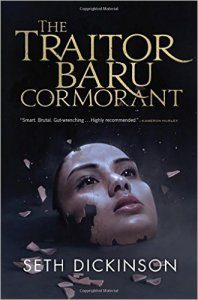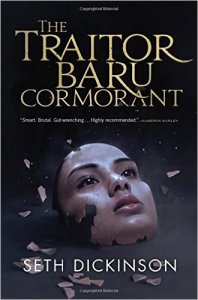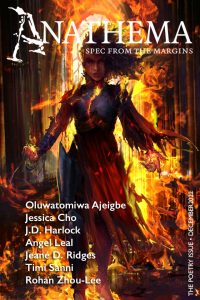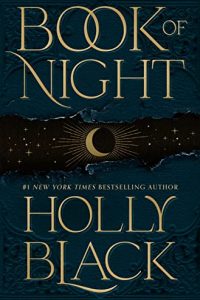Paul Di Filippo reviews Seth Dickinson
The Traitor Baru Cormorant, by Seth Dickinson (Tor 978-0-7653-8072-2, $25.99, 400pp, hardcover) September 2015
 Next year, 2016, marks the fortieth anniversary of C. J. Cherryh’s debut with Gate of Ivrel. Her influence on many younger writers who followed her is, I think, under-acknowledged. Cherryh’s unique blend of intense, cryptic, codified alien cultures; her ofttimes febrile emotional climate; her languorous pacing and intricate dance of manners substituting for more conventional action—all these traits can be seen in many contemporary fantasy and SF novels. In toto, she has contributed a truly quirky and stylish new wing to the genre’s many mansions, while telling some unforgettable stories. I opined in this venue a while back that Norman Spinrad deserved a SFWA Grandmastership. Surely the same can be said of Cherryh.
Next year, 2016, marks the fortieth anniversary of C. J. Cherryh’s debut with Gate of Ivrel. Her influence on many younger writers who followed her is, I think, under-acknowledged. Cherryh’s unique blend of intense, cryptic, codified alien cultures; her ofttimes febrile emotional climate; her languorous pacing and intricate dance of manners substituting for more conventional action—all these traits can be seen in many contemporary fantasy and SF novels. In toto, she has contributed a truly quirky and stylish new wing to the genre’s many mansions, while telling some unforgettable stories. I opined in this venue a while back that Norman Spinrad deserved a SFWA Grandmastership. Surely the same can be said of Cherryh.
Cherryh’s influence can be seen and felt, I think, in the debut novel from Seth Dickinson, The Traitor Baru Cormorant. There is the same sense of culture clash mediated through politesse, with deadly stakes, for one major aspect. But another tributary stream flows into the book, and those equally rich waters derive from Samuel Delany’s Return to Nevèrÿon series. Dickinson has taken the gender concerns of Delany, and Delany’s attention to economic/vocational matters and colonialism/imperialism, all set in a pre-technological milieu, and conflated them with some of the aforementioned Cherryh-esque literary/thematic tactics to create a truly fine and distinctively individual fantasy novel that delivers action and philosophy, economics and warfare, love and hatred, in equal measures. His voice, however originally influenced, rings out strong and clear as a new addition to the chorus of fantasists.
“Baru Comorant” is the name of our unstoppable, ingenious, lonely heroine. We see her first when she is just a small girl living a somewhat idyllic life on the benign and humble isle of Taranoke, an independent realm that has a blended feel of both our Polynesia and maybe some Caribbean and Greek islands as well. The dominant family setup there features two father/husbands and one mother/wife. Baru, only daughter, is enmeshed in the kindly, protective folds of her own quintessential domestic arrangement. But then, insidiously at first, as mere traders, come the representatives of the faraway Empire of Masks (who happen to classify polyandry and lesbian/gay relations as mortal sin). Soon Taranoke finds itself being colonized both economically and bureaucratically and ultimately, militarily. Finally, in Baru’s adolescence, her birthplace is fully under the yoke of the Empire, her family life is broken up, and she finds herself enrolled in the Empire’s educational system, akin to those classic institutions we recognize, from contemporary England and France to ancient China and imperial Rome, that have the main purpose of grooming functionaries for service to the Empire, and, secondarily, of habituating the conquered to their new overlords and cultivating their “barbaric” loyalty.
Extremely smart and talented, prized as a worthy discovery by her Machiavellian mentor, Cairdine Farrier, Baru realizes quite clearly exactly how she is being shaped for the ends of the Empire, but she resolves to take the tainted gifts of her new masters and someday utilize them to liberate Taranoke and restore it to the pristine condition of her youth. But can she become a tool of the Empire and still retain her original drive and commitment? That’s the essential quandary of the book, and of Baru’s life.
Once graduated, Baru is sent to the mainland of Aurdwynn, a land of rival duchies, in the role of—get ready for her prestigious new title—Imperial Accountant. Yes, here come the Delanyesque riffs. Baru is no warrior woman, but rather a green-eyeshade-and-cuff-garters toiler over ledgers and agricultural futures, the truly important vectors of Empire. “Follow the money!” becomes her battle cry. The book could have easily stalled dead at this point—I am reminded of the parody of Star Wars on The Simpsons, where the anguished family was subjected to a three-hour onscreen debate about interstellar tariffs—but somehow Dickinson manages to make Baru’s exploits—which involve more than a few threats to her life—into engrossing material. By the time she unleashes her secret fiscal weapon to attain her goals—which overlap those of the Empire while not being entirely congruent—the reader will be wholeheartedly rooting for Baru and her plots. In a way, given the glamour that our current culture attaches to rich bankers and hedge fund traders and their ilk, this is a perfectly logical development for the fantasy genre. Conan the Libertarian, maybe?
And, as I mentioned in a yet unpublished review of Fran Wilde’s Updraft, there exists a very potent mythic narrative template—“talented novice from outside the system joins the establishment and works to undermine and reform it without being coopted”—which Dickinson employs here to good effect.
In any case, the Imperial Accountant bits constitute only the first third of the book. The second part, “Warlord,” segues into actual combat as Baru seemingly betrays her Empire allegiances to lead the duchies against the Masquerade. But even in this section, Baru remains true to her own capacities and nature. Asked if she considers herself a military general now, she replies, “I’m not. I know money, logistics, shipping, and infrastructure. And those are the weapons…” The long campaign continues in the third installment, “Autarch,” as Baru pursues her “rebellion of shadows,” built out of “tricks of ink and paper wealth.” The conclusion to the rebellion leaves her in a highly unanticipated situation, as Dickinson masterfully inverts almost all of the reader’s expectations. A sequel seems both necessary and welcome.
Dickinson’s prose is deft and forceful. Here is just a single example of its sensual and sensory force and impactful poetic utility: “The winter smeared her in Aurdwynn, caked her in its churned mud, filled her with its guinea-fowl curries and venison and salted fish, clotted her pores with the oil and scents of cumin and wild ginger and crusted salt… She learned the different tastes of cedar and redwood smoke…”
As for his characters, they are all built to clever and deep dimensions, with fully human qualities and motives. Some of the relationships here, such as those between Tain Hu and Baru, are deeply poignant. And Dickinson can evoke physicality with even a single sentence. “How ancient and forbidding her eyes…eyes of dry bone, eyes of scurvy and desperate cold and rime on stone.”
By the end, this somewhat mannerpunk volume succeeds in building and exploring a morally treacherous world populated with exotic characters whose hearts nonetheless align with ours. Readers who have enjoyed Daniel Abraham’s Long Price Quartet or Paul Park’s Starbridge Chronicles will find much to admire here.






